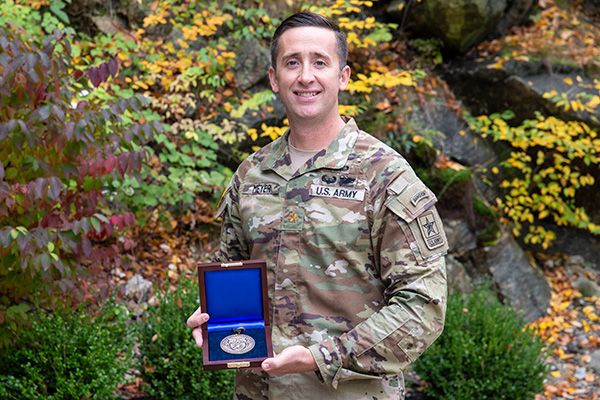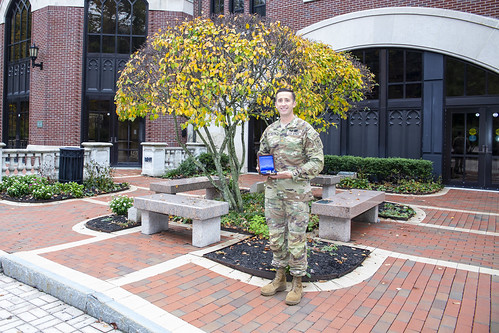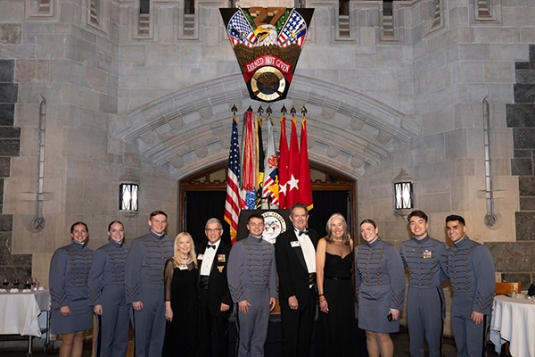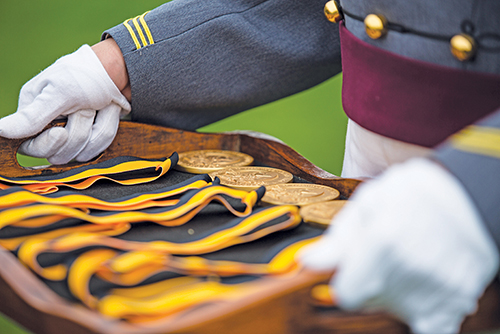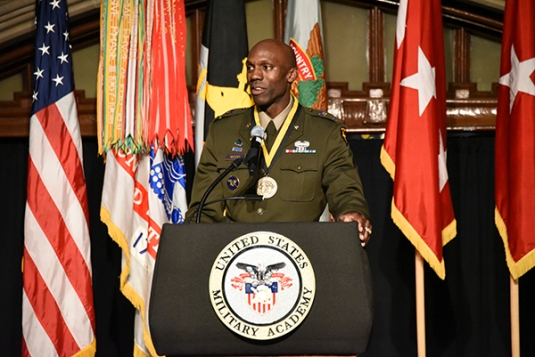Major John A. Meyer ʼ05, the 2020 recipient of the Alexander R. Nininger Award for Valor at Arms, always knew service would be an important part of his life when he began his 47-month journey at the U.S. Military Academy during the summer of 2001. But like the current Corps of Cadets dealing with the uncertainty and challenges of the COVID-19 pandemic, Meyer’s West Point class would soon face circumstances they did not expect.
A few weeks after arriving at West Point, the world turned upside down, and Meyer’s graduating class of 2005 would become known as “The Class of 9/11.” The events of that day and the War on Terrorism would shape their four years of training and education.
“West Point is not combat; however, West Point is a trial,” Meyer said. “And at West Point, you go through ups and downs and you start to build that resiliency and that grit.”
That “resilience and grit” would become critically important when Meyer and the rest of his platoon faced the events of July 27, 2007.
On that day, Meyer was a platoon leader for 2nd Platoon, B Troop, 1st Squadron, 91st Cavalry (Airborne) deployed to Camp Keating, the furthest American outpost in northeastern Afghanistan along the Kunar River Valley. Their mission was to secure the ground route from FOB Naray—the location of the squadron headquarters—all the way north to Camp Keating by establishing short-term observation posts or OPs and defensive positions along the route.
Upon departing the village that morning, Meyer’s lead squad conducted reconnaissance up the mountain to locate a suitable overwatch position for the troop. The attached Afghan Army soldiers crossed the river and, unbeknownst to either side, ran into enemy fighters. Immediately both sides engaged one another with small arms fire and RPGs. The valley began to wake up, with a sizable enemy force prepositioned in caves and ambush locations on both sides of the river.
“To this day I fully believe that neither side was aware of anyone’s presence,” Meyer said. “The enemy was completely caught off guard. This was an enemy force of estimated over 150 enemy fighters, we were at just over 60 on the ground.”
The action on the ground quickly evolved into a serious situation, with a soldier from first platoon shot in the neck and Meyer’s mortarman shot while providing effective fire on the enemy. His platoon was now split, with the lead squad 100 meters up the mountain and the remainder of the platoon along with Troop headquarters in hasty defensive positions at the base of the mountain. A MEDEVAC aircraft was en route for the 1st platoon soldier, and Meyer’s platoon had already sustained several casualties due to gunshot wounds.
The fight continued to intensify, and Troop headquarters was struck by an RPG round, leaving Troop Commander MAJ Thomas Bostick killed and everyone in the headquarters wounded, including the fire support officer, LT Kenny Johnson ʼ06. At this point, Meyer said they committed their third platoon, which was the quick reaction force, so all three platoons were now involved in the fight. Squad leader SSG Ryan Fritsche was shot and killed and there were well over 10-12 wounded, some of them in critical condition. Decisions had to be made whether to try and hold there or try to move back to somewhere where they could sustain the fight. Talking to all of the other lieutenants on the ground and NCOs, they made the decision to fight their way back out so they could fly out all of the critically wounded casualties and reestablish high ground.
“I mean we were caught,” Meyer said. “We had enemy behind us and in front of us. And so we moved down by the trucks. We put all of our wounded in the trucks. We ran beside the vehicles and we eventually fought our way out.”
Many more were shot and wounded by RPG shrapnel, but they were able to fly out all of the wounded and establish themselves in a more defensible position. Meyer received the Silver Star for his actions on that day.
In recounting the events of that day to the Corps of Cadets gathered in the mess hall for the Nininger Award dinner on October 22, Meyer attributed their success to the selfless leadership, humility, and passion displayed by those who fought alongside him. They include fallen Troop Commander MAJ Bostick, E5 SGTs Henley and Wilson—who stepped into squad leader positions because of wounded—and PFC Barba, who was shot in the jaw but continued to engage the enemy and lead by example.
“It was a very difficult fight out of the ambush area, but I will tell you that the courage and the bravery displayed by the soldiers and the NCOs, by LT David Roller ʼ05, LT Kenny Johnson ʼ06, LT Alex Neusom, my NCOs and soldiers was just incredible. No one argued. Everyone stayed focused. Everyone stayed part of this overall team, and this was after we had lost our troop commander, who was like a hero to all of us.”
Meyer told the Corps that humility is arguably the greatest leadership trait, to be a sponge, and to learn each day from the finest non-commissioned officers in the world.
“But in the end, know you are in charge,” Meyer said. “When bullets start flying, your soldiers will look to you. They won’t look for perfection or the smartest military plan, they will look for courage and leadership from the officer standing shoulder to shoulder with them. When in charge, take charge.”
In bestowing him with the 2020 Nininger Award, the West Point Association of Graduates recognizes Major John A. Meyer for his personal bravery and leadership and regards him as a representative of all West Point-commissioned officers who have heroically led soldiers in combat.
Announcement
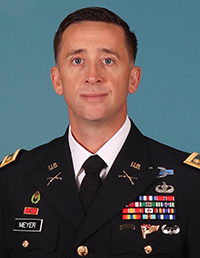
September 2, 2020
West Point, NY: West Point Association of Graduates is pleased to announce that Major John A. Meyer, Class of 2005, has been selected to receive the 2020 Alexander Nininger Award for Valor at Arms, which will be presented to him on October 22, 2020, at West Point, New York. Meyer is currently serving in the Congressional Fellowship Program, in Washington, DC.
In 2007, then First Lieutenant Meyer was serving as a platoon leader for 2nd Platoon, B Troop, 1st Squadron, 91st Cavalry (Airborne) in Afghanistan in support of Operation Enduring Freedom. Early in the morning of July 27, Meyer’s platoon moved into the town of Saret Kholeh along with a sniper team and Bulldawg 6’s Headquarters section. They had just completed a key leader engagement and village assessment and were moving into positions along the southeastern portion of the village when they began taking fire from an enemy force of more than 100 fighters. Meyer directed his platoon to fighting positions and returned fire, effectively employing all available assets. Due to the ferocity of his direct, indirect, and close air support fires, the enemy was forced to break contact, and the lull in the fight enabled him to evacuate three casualties safely. The enemy reorganized and reinforced its attack. With his commander fallen, Meyer immediately took charge of the situation, returning fire while coordinating for link-up with the QRF to attack by fire and secure casualties. With the position consolidated and casualties safe, Meyer directed his soldiers to more defensible terrain where they could continue the fight so that others could complete casualty evacuation with air MEDEVAC. According to the citation of the Silver Star he received for his actions on that day: “First Lieutenant Meyer was in full control of his element, giving effective orders in the face of heavy fire from a numerically superior enemy force…In the face of intense enemy fire and despite the loss of his commander, he took command on the ground, and directed the fight brilliantly. His actions saved the lives of many of his comrades. His extraordinary heroism under fire exemplifies the Warrior Ethos and stands as a timeless example of combat leadership under extreme duress.”
In addition to the Silver Star, Meyer has been awarded two Bronze Stars, and three Meritorious Service Ribbons. Since 2007, Meyer served as a Ranger instructor, commander of a Stryker Company in Afghanistan (2011), commander I CORPS Long Range Surveillance Company, and most recently as the operations officer for 1-27 IN Battalion, and 2nd Brigade, 25th Infantry Division. He is currently assigned in Washington, DC, and lives in Annapolis with his wife, Lauren, and his three children: Thomas, William, and Charlotte.
Speech
Lieutenant General and Mrs. Williams, Mr. Browne, members of the USMA leadership team, friends, family, and most importantly the Corps of Cadets: thank you for being here tonight. I want to give a special thanks to my family and friends who are watching online. I want to thank my wife, Lauren, and kids—Thomas, William, and Charlotte—for your love and support. Lauren, thank you for 15 years of selfless commitment not only to our family but the many Army families that we had the honor to serve with.
I want to express my gratitude for receiving this prestigious award. The opportunity to address you is an incredible honor, and I am humbled by the entire experience. Standing here today, I look out and remember being in your shoes 16 years ago. I was a prepster, Army soccer player, and served in C-2 and E-4. USMAPS! Go Army Soccer! Go Circus! War Elephants! (War Elephants sounds a whole lot better than Elvis Lives, which is what it was when I was there!) I was not always the greatest cadet. I did not enjoy shining my shoes, making my bed, and getting haircuts. I once got caught with a mystery piece of dusty pizza crust in the rifle rack during a SAMI inspection plebe year. I had two options: eat the month-old crust or get written up. I ate the crust! I also rode the old library book elevator with my plebe year roommate, Andy Goehring. Thank God the elevator held us Andy!
What I did embrace, was the spirit of the school—Duty, Honor, Country—the character building, the lifelong friendships, and, most of all, the Army training. Since I was young, I wanted to serve in the military, but my journey has not always been easy. What drives me, and I would argue most leaders, is a commitment to the greater good of the organization, passion for the profession, and an attitude focused on humility.
While I aim to honor all graduates and the soldiers and leaders with whom I served with, the purpose of this speech is to have a frank and honest discussion with you, the Corps of Cadets. I hope that some of my thoughts can serve you as you embark on your future career.
I have had the honor of being surrounded by heroes throughout my time in the Army. I started off as a platoon leader in 1-91 CAV of the 173rd Airborne Brigade. In April 2007, we deployed to northeastern Afghanistan along the Kunar River Valley. My troop was assigned to Camp Keating, the furthest American outpost in northeastern Afghanistan. In July, 1-91 CAV planned a large-scale operation to secure the ground route from FOB Naray, the location of the squadron headquarters, all the way north to Camp Keating. The concept for the operation was for all the troops and companies to establish short term observation posts or OPs and defensive positions along the route. We expected enemy contact, and in fact, prior to our arrival, an Afghan Army convoy was ambushed, sustaining significant casualties in that same area.
I was the platoon leader for second platoon in Bulldawg Troop. The troop was given the mission of securing an observation post along the Kunar River to the east of Camp Keating.
Twenty-four hours prior to our departure, a portion of 1st platoon, led by Dave Roller, USMA Class of 2005, set up an overwatch position to observe the village and route leading to our objective.
My platoon and the troop HQs served as the main effort for the mission and departed our combat outpost in the early morning hours of 27 July. My platoon’s mission was to conduct the key leader engagement and establish the troop’s OP. Upon departing the village, my lead squad, along with attached snipers, conducted reconnaissance up the mountain to locate a suitable position for the troop. During this time, the attached Afghan Army soldiers crossed the river and unbeknownst to either side, ran into enemy fighters less than 100 meters away. Immediately both sides engaged one another with small arms fire and RPGs. At this point in the morning, the valley began to wake up, with an enemy force of over 150 fighters, prepositioned in caves and ambush locations on both sides of the river.
First platoon’s overwatch position was attacked high on a ridgeline, then the enemy turned their attention on the main effort deep in the valley. A soldier from 1st platoon was shot in the neck and, soon after, my mortarman was shot while providing effective fire on the enemy. The action on the ground quickly evolved into a serious situation. My platoon was now split. My lead squad was 100 meters up the mountain re-conning the OP location, and the remainder of the PLT along with troop headquarters were in hasty defensive positions at the base of the mountain.
To this day, I believe the enemy was completely caught off guard by our maneuver into the valley. It took them time to move into their pre-dug ambush positions located along the mountainside. At this point in the fight it was mid-morning on 27 July, we had a MEDEVAC aircraft in route for the 1st PLT soldier, and my PLT already sustained several casualties due to gunshot wounds.
I would like to share the remainder of this battle by highlighting actions from the heroes of 27 July. My goal is to highlight leadership and warrior traits both exhibited that day and ones that can be emulated by you as you prepare to take over your first platoon and positions in the Army.
1. Selfless Leadership: Major Thomas Bostick was our troop commander, a former enlisted Ranger and experienced warrior. Tom completed multiple combat deployments, to include jumping into Afghanistan with the 75th Ranger Regiment weeks after the Twin Towers fell. Bulldawg Troop was his second company command and the men, and I would have followed him into hell and back. He led, not by verbose yelling; he led by his own example. As the fight continued to intensify on 27 July, it was Major Bostick who kept the team calm. He was never flustered and even kept things light on the radio. Major Bostick directed attack aviation, artillery, and continued to lead by personal example until an enemy RPG round struck his position, killing him and injuring all the members of the troop HQs. It can be said, a leader is best judged not by the units’ actions under his command, but by the actions of the soldiers when he or she is not present. The soldiers of Bulldawg Troop, driven by Major Bostick’s selfless leadership, continued to fight and persevere. For his actions, Major Bostick received the Distinguished Service Cross.
Another example of selfless leadership is Sergeant Robert Fortner. Rob, our platoon medic, was shot around the same time that Major Bostick was killed. Sergeant Fortner continued treating casualties and, in fact, refused medical evacuation in order to stay in the fight and continue providing treatment. Sergeant Fortner’s actions demonstrated his commitment to the soldiers, the mission, and his position as the platoon medic. Sergeant Fortner set the example for all of us and received the Silver Star for his actions.
2. Humility: Sergeants Heath and Wilson, team leaders in my platoon, demonstrated humility and courage to take charge, knowing they didn’t have the experience to lead in their new positions. Both warriors were thrust into squad leader positions on 27 July, not by choice or promotion but out of necessity. Staff Sergeant Ryan Fritsche, my newly arrived squad leader, led the squad conducting the recon up the mountain. Enemy forces hiding in caves engaged his squad, and Staff Sergeant Fritsche was shot and killed. Afterwards, his squad was pushed down the mountain to our location due to intense enemy fire. It was now up to Sergeant Wilson, his team leader, to lead the squad. Sergeant Heath entered the mission as the acting squad leader after his predecessor sustained an injury one week prior. Both E5 sergeants had a choice, let fear and the unknown of a new position take over, or lead their soldiers to the best of their ability. Both leaders rose to the occasion, making a significant impact to the platoon and the mission.
All three PLTs are now fully engaged in the fight. My commander and squad leader are killed, and we have sustained many casualties requiring immediate evacuation. Multiple soldiers are in urgent and urgent surgical conditions. My squad leader’s body lay 100 meters up the mountain from my location and the enemy is now in between our positions. Three AH-64 Apaches arrived on station to provide some much-needed support. Soon after, the enemy unveiled a DShKA, a heavy weapon machine gun, on the mountainside above me. The DShKA fire struck the Apaches, forcing them to return to base. The only remaining assets providing effective fire were Air Force fixed wing. After discussions with the other lieutenants and my platoon sergeant, Johnny Ray Holley, we made the decision to fight back to a more defensible position in order to conduct aerial MEDAVC and reorganize our forces. The decision to leave Staff Sergeant Fritsche was incredibly difficult, fully acknowledging that leaving a fallen comrade is against the Ranger Creed and conduct of the American soldier. We were losing too many soldiers and needed a position of advantage to regain the upper hand on the enemy and to evacuate our wounded.
3. Passion: The American soldier is incredible. Be willing to humbly lead from the front with honesty, courage, and passion and they will follow you anywhere. I explained our plan on the radio to move to the trucks, use them for cover, and fight our way out of the ambush area. Once I gave the order, my soldiers—Stevenson, Gates, Barba, Dunn, Trapyline, Eldridge and many others in the platoon—did not question the order or argue: they moved out with violent intent and courage. The HMMWVs were completely full of wounded soldiers. Every able body ran beside the trucks engaging the enemy on both sides of the river. During the exfiltration, the formation was pinned down due to intense enemy fire. Multiple soldiers were shot and received wounds from RPG rounds exploding around us. One soldier, Private First Class Barba was shot in the face. While pinned down, he turned to me and said, “Sir, I am shot.” All I could do in the moment was to tell Barba to continue moving forward. We were in the kill zone and had to maintain momentum. So, Private First Class Barba, shot in the jaw, continued to engage the enemy and lead by example. These soldiers owed me nothing but gave their everything for the unit, the mission, and most importantly for each other.
We made it through the ambush zone and established a new defensive position at the base of 1st platoon’s overwatch location. We were able to evacuate all wounded soldiers, Major Bostick, and conduct much needed resupply for all positions.
On 27 July 2007, Bulldawg Troop lost two great Americans and sustained almost a platoon’s worth of casualties. In contrast, the estimated enemy casualties were staggeringly high. When the brigade quick reaction force flew into recover Staff Sergeant Fritsche, not a single shot was fired and not a single enemy soldier was spotted. The soldiers of Bulldawg Troop displayed incredible courage under fire and violence of action engaging a numerically superior enemy force which outnumbered them three to one. This award is dedicated to my platoon, Bulldawg Troop, and the families of Major Tom Bostick and Staff Sergeant Ryan Fritsche. Please join me in a round of applause to honor the soldiers, the fallen, and the families of Bulldawg Troop.
Many soldiers and leaders have war stories of great courage and bravery. My question tonight is what does this mean for you? How can you apply these lessons to your own life and profession? I would like to offer three points for you to consider and potentially even for you to challenge yourself as a leader.
1. Selfless Leadership: Our profession is all about the team over one’s own accomplishments. Everything we do is about the organization and the soldiers. Selfless leadership is demonstrated through tough training and personal sacrifice. West Point and the Army will continue to evaluate you and your peers. Don’t allow this to change your perspective on teamwork and your commitment to your fellow officers. Work hard for the immense honor of leading soldiers. Look around the room, your peers will be with you long after graduation day. They will be at your wedding, promotions, and support you during combat operations. On 27 July, three out of the four lieutenants were West Pointers. David Roller (’05), Kenny Johnson (’06) and myself. The fourth, Alex Newsom, was smarter than all of us and attended UC Santa Barbra. Our ability to remain calm and work together as a team, was a significant reason we were successful on that day. During my next deployment as a company commander in southeastern Afghanistan, it was my classmate, Michael Linnington, who sent his aircraft to my area of operations every day because he knew we were constantly in firefights. Selfless service to your organization, soldiers, and peers is part of what distinguishes us from all other professions.
2. Humility: Your attitude will set the tone for your platoon. You will make mistakes and your soldiers will make mistakes. Fail forward! Don’t be afraid of failing and most importantly, learn from those mistakes. Your grit, your fortitude to fight through tough days will translate to building resilient, combat ready teams. President Theodore Roosevelt made his thoughts clear on attitude when he addressed the French leadership regarding willingness to humbly and boldly serve, when he said, “It is not the critic who counts; not the man or woman who points out how the strong man stumbles. The credit belongs to the man or woman who is actually in the arena, whose face is marred by dust and sweat and blood.” Let us all strive to face tomorrow’s challenges with an attitude voraciously ready to enter that arena!
Humility is arguably the greatest leadership trait. You will arrive to your first platoon educated, trained, and hungry. You must balance your confidence with an acknowledgment of the experience of your soldiers and NCOs. Be a sponge, learn each day from the finest non-commissioned officers in the world. They will steer you in the right direction, uphold the highest standards, and act as a great sounding board for your ideas. But in the end, know you are in charge. Most importantly, be authentic and be yourself. When bullets start flying, your soldiers will look to you! They won’t look for perfection or the smartest military plan, they will look for courage and leadership from the officer standing shoulder to shoulder with them! When in charge, take charge.
3. Passion: Care and show your soldiers that you care, but as Colin Powell said, “Get mad, then get over it” Passion is a powerful force that allows you to persevere through difficult times. Tough times don’t last, but tough leaders and organizations do! Passion will give you strength to overcome your fears, boldly lead your platoon, and humbly make mistakes. Passion gives us energy and motivation to become masters of our trade. To become technically and tactically proficient so we are ready to be our best, for our soldiers and to accomplish the mission. Find your passion in our profession and let that drive you to be the best you! It doesn’t matter your branch, be great at whatever you do. Our Army needs and deserves passionate and committed logisticians, air defenders, pilots, transporters, and infantry officers.
In closing, now more than ever, our nation needs leaders of character. This great land is recovering from a terrible pandemic, reeling from hate and anger, and currently going through a polarized election. I am optimistic about the future of this land because of you, the leaders who will take this country into the future. My children sitting here today love their country and are certainly interested in service, hopefully West Point. They don’t look at me as their hero, they look at you! You will lead the sons and daughters of this great nation into the future. You all represent what is truly great about our nation. You represent respect, diversity, equality, sacrifice, and a commitment of service to defend the Constitution! Be confident and proud of who you are and where you are going. I am eager to serve with you in any formation. Lead by example, be humble and be passionate. Thank you for this great honor.
God Bless the United States Military Academy, God Bless the United States Army, and God Bless America!
Go Army, Beat Navy! Rangers Lead The Way!

